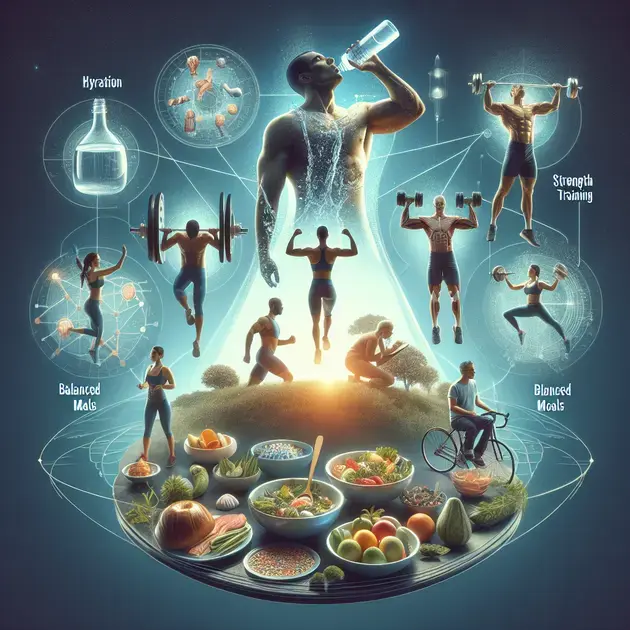Are you looking to boost your metabolism for higher energy levels? Maintaining a healthy metabolism is key to feeling energetic and productive throughout the day.
With the right lifestyle habits and nutrition, you can optimize your metabolism and experience a significant increase in your energy levels. Let’s explore some effective strategies to rev up your metabolism and enhance your overall well-being.

Simple and Effective Tips to Boost Your Metabolism
Boosting your metabolism is key to achieving and maintaining a healthy weight. Here are some simple and effective tips to help rev up your metabolism:
1. Stay Hydrated
Drinking plenty of water throughout the day can help boost your metabolism. An easy way to track your water intake is by using the app “WaterMinder,” which allows you to set daily hydration goals and sends reminders to ensure you stay on track.
2. Incorporate Strength Training
Adding strength training exercises to your workout routine can help increase muscle mass, which in turn boosts your metabolism. Apps like “MyFitnessPal” offer personalized workout plans that include strength training exercises suitable for all fitness levels.
3. Get Sufficient Sleep
Quality sleep is crucial for a healthy metabolism. To improve your sleep habits, consider using the app “Sleep Cycle,” which analyzes your sleep patterns and provides insights on how to optimize your sleep for better metabolic function.
4. Eat Protein with Every Meal
Protein requires more energy to digest compared to fats or carbohydrates, leading to a temporary increase in metabolism. Utilize meal planning apps like “MyPlate” to ensure you are incorporating enough protein into your daily diet.
5. Spice Up Your Meals
Incorporating spicy foods into your diet, such as chili peppers or cayenne pepper, can temporarily increase your metabolism. Apps like “Yummly” offer a variety of spicy recipes to help you add a metabolic boost to your meals.
The Importance of Nutrition in Fueling Your Metabolism
Nutrition plays a vital role in fueling your metabolism and overall energy levels. Here are some key factors to consider when it comes to nutrition and metabolism:
1. Balanced Meals
Eating balanced meals that include a mix of protein, healthy fats, and carbohydrates can help support a healthy metabolism. Use meal planning websites like “Eat This Much” to generate customized meal plans based on your nutritional needs.
2. Avoid Skipping Meals
Skipping meals can slow down your metabolism as your body goes into a conservation mode. To ensure you are eating at regular intervals, consider using the app “Mealime,” which offers quick and healthy meal options to keep your metabolism running efficiently.
3. Incorporate Superfoods
Superfoods like blueberries, spinach, and quinoa are packed with nutrients that can help boost your metabolism. Get inspiration for incorporating superfoods into your diet by exploring recipes on websites like “EatingWell.”
4. Monitor Your Sugar Intake
Excessive sugar consumption can negatively impact your metabolism. Track your sugar intake using apps like “MyFitnessPal” to ensure you are staying within recommended limits and fueling your body with the right nutrients.
5. Stay Mindful of Portion Sizes
Overeating, even healthy foods, can lead to weight gain and impact your metabolism. Use portion control tools like the “Meal Prep Mate” app to help you achieve the right balance of nutrients and maintain a healthy metabolism.
Incorporating Lifestyle Changes for Long-Term Energy Benefits
Long-term energy benefits require sustainable lifestyle changes. Here are some strategies to incorporate into your daily routine for improved energy levels:
1. Prioritize Regular Exercise
Regular physical activity not only boosts your metabolism but also enhances your overall energy levels. Stay motivated with workout routines from the “Nike Training Club” app, offering a variety of exercises for all fitness levels.
2. Manage Stress Levels
Chronic stress can negatively impact your metabolism and energy levels. Practice mindfulness and stress-reducing techniques using the “Calm” app, which provides guided meditation sessions and relaxation exercises.
3. Stay Active Throughout the Day
Incorporate movement into your daily routine by taking short walks, using standing desks, or trying desk exercises. Apps like “Stand Up! The Work Break Timer” remind you to take active breaks throughout the day to boost energy and metabolism.
4. Optimize Your Vitamin Intake
Certain vitamins and minerals play a crucial role in energy metabolism. Track your daily vitamin intake with the “MyVitaminPacks” app, which offers personalized recommendations based on your dietary preferences and needs.
5. Establish a Consistent Sleep Schedule
A consistent sleep schedule is essential for long-term energy benefits. Improve your sleep consistency with the “Sleep Time” app, which helps you create and stick to a sleep routine to enhance your metabolism and overall energy levels.

Natural Ways to Enhance Your Metabolism
When it comes to boosting your metabolism naturally, there are several effective strategies you can incorporate into your daily routine. One of the most important things you can do is to stay hydrated by drinking plenty of water throughout the day. Water helps to support the metabolic processes in your body and can even help you burn more calories.
Another key factor in enhancing your metabolism is getting an adequate amount of sleep. Lack of sleep can slow down your metabolism and make it harder for your body to burn calories efficiently. Aim for 7-9 hours of quality sleep each night to support optimal metabolic function.
Incorporating strength training exercises into your workout routine is also a great way to boost your metabolism. Muscle burns more calories at rest than fat, so increasing your muscle mass can help you burn more calories throughout the day. Consider adding weightlifting or bodyweight exercises to your workouts a few times a week.
Additionally, consuming metabolism-boosting foods such as spicy peppers, green tea, and lean proteins can help give your metabolism a natural lift. These foods contain compounds that can increase your metabolic rate and help you burn more calories, even while at rest.
By incorporating these natural ways to enhance your metabolism into your lifestyle, you can support a healthy metabolism and improve your overall energy levels.
Maximizing Your Energy Levels Through Smart Food Choices
When it comes to maximizing your energy levels through smart food choices, focusing on nutrient-dense foods is key. Avoiding processed foods high in sugars and unhealthy fats can help prevent energy crashes and keep your metabolism running smoothly.
Including a balance of complex carbohydrates, lean proteins, and healthy fats in your diet can provide sustained energy throughout the day. Foods such as whole grains, nuts, seeds, and leafy greens are excellent choices for supporting optimal energy levels.
Eating regular meals and snacks can also help maintain steady blood sugar levels and prevent energy dips. Aim to eat every 3-4 hours and include a mix of carbohydrates, proteins, and fats in each meal to keep your energy levels stable.
Hydrating with water and herbal teas can also contribute to your energy levels by supporting proper hydration and helping your body function optimally. Dehydration can lead to fatigue and decreased energy, so staying hydrated is essential for maximizing your energy levels.
Overall, making smart food choices that support a balanced diet rich in nutrients can help you maximize your energy levels and feel your best throughout the day.
The Science Behind Exercise for Boosting Metabolism
Exercise plays a crucial role in boosting your metabolism and helping you burn more calories. When you engage in physical activity, your body burns calories for energy, and regular exercise can increase your metabolic rate over time.
Cardiovascular exercises such as running, cycling, or swimming can help burn a significant amount of calories during your workout and can also boost your metabolism post-exercise. This is known as excess post-exercise oxygen consumption (EPOC), where your body continues to burn calories at an elevated rate after exercise to recover.
Strength training is another effective form of exercise for boosting metabolism, as building muscle mass increases the number of calories your body burns at rest. By incorporating weightlifting or resistance exercises into your routine, you can support a higher metabolic rate and improve your overall calorie-burning potential.
High-intensity interval training (HIIT) is a particularly effective form of exercise for boosting metabolism. HIIT involves short bursts of intense exercise followed by periods of rest or lower-intensity activity. This type of workout can increase your metabolic rate both during and after your workout, making it a time-efficient way to burn calories and boost metabolism.
By understanding the science behind exercise and how it can positively impact your metabolism, you can create a well-rounded fitness routine that supports both your physical health and metabolic function.
Conclusion
Enhancing your metabolism naturally requires a holistic approach that combines hydration, adequate sleep, strength training, and metabolism-boosting foods. By staying hydrated with water, supporting your metabolic processes, and increasing calorie burn, you can set the foundation for a healthy metabolism. Additionally, prioritizing quality sleep of 7-9 hours each night is crucial to prevent metabolic slowdown and optimize calorie efficiency.
Maximizing energy levels through smart food choices involves focusing on nutrient-dense foods like whole grains, lean proteins, and healthy fats. By avoiding processed foods high in sugars and unhealthy fats, you can prevent energy crashes and promote a smoothly running metabolism. Regular meals and snacks containing a mix of carbohydrates, proteins, and fats support steady blood sugar levels, while hydration with water and herbal teas contributes to optimal energy levels by preventing fatigue and dehydration.
The science behind exercise for boosting metabolism highlights the importance of physical activity in increasing calorie burn and metabolic rate. Incorporating cardiovascular exercises, strength training, and high-intensity interval training can all play a role in enhancing metabolism and burning calories. Understanding how exercise impacts metabolism allows you to create a well-rounded fitness routine that supports both your physical health and metabolic function, ultimately leading to improved energy levels and overall well-being.